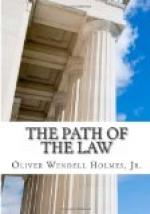So much for the fallacy of logical form. Now let us consider the present condition of the law as a subject for study, and the ideal toward which it tends. We still are far from the point of view which I desire to see reached. No one has reached it or can reach it as yet. We are only at the beginning of a philosophical reaction, and of a reconsideration of the worth of doctrines which for the most part still are taken for granted without any deliberate, conscious, and systematic questioning of their grounds. The development of our law has gone on for nearly a thousand years, like the development of a plant, each generation taking the inevitable next step, mind, like matter, simply obeying a law of spontaneous growth. It is perfectly natural and right that it should have been so. Imitation is a necessity of human nature, as has been illustrated by a remarkable French writer, M. Tard, in an admirable book, Les Lois de l’Imitation. Most of the things we do, we do for no better reason than that our fathers have done them or that our neighbors do them, and the same is true of a larger part than we suspect of what we think. The reason is a good one, because our short life gives us no time for a better, but it is not the best. It does not follow, because we all are compelled to take on faith at second hand most of the rules on which we base our action and our thought, that each of us may not try to set some corner of his world in the order of reason, or that all of us collectively should not aspire to carry reason as far as it will go throughout the whole domain. In regard to the law, it is true, no doubt, that an evolutionist will hesitate to affirm universal validity for his social ideals, or for the principles which he thinks should be embodied in legislation. He is content if he can prove them best for here and now. He may be ready to admit that he knows nothing about an absolute best in the cosmos, and even that he knows next to nothing about a permanent best for men. Still it is true that a body of law is more rational and more civilized when every rule it contains is referred articulately and definitely to an end which it subserves, and when the grounds for desiring that end are stated or are ready to be stated in words.
At present, in very many cases, if we want to know why a rule of law has taken its particular shape, and more or less if we want to know why it exists at all, we go to tradition. We follow it into the Year Books, and perhaps beyond them to the customs of the Salian Franks, and somewhere in the past, in the German forests, in the needs of Norman kings, in the assumptions of a dominant class, in the absence of generalized ideas, we find out the practical motive for what now best is justified by the mere fact of its acceptance and that men are accustomed to it. The rational study of law is still to a large extent the study of history. History must be a part of the study, because without it we cannot know the




